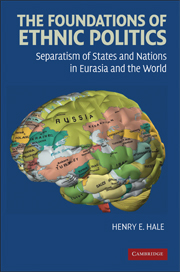Part II - Case Comparisons: Separatism in Eurasia
Published online by Cambridge University Press: 05 September 2012
Summary
Specialists tend to be divided on the role of ethnicity in separatism, as described in Chapter 4. Ethnicity-as-conflictual theorists hold that ethnic divides are inherently fraught with conflict potential and that, in the absence of constraining or countervailing factors, a group that is conscious of its own national distinctiveness will naturally gravitate toward demands for a state of its own. These scholars may vigorously disagree on whether national consciousness is an age-old primordial bond or a contingent and constructed product of history and institutions, but they concur that it is the most fundamental motivating force behind separatism. The other side in the debate takes a starkly different view, denying that ethnicity has any intrinsic meaning for separatism. Instead, ethnicity-as-epiphenomenal theorists see nationality as simply a set of useful lines along which greedy or ambitious elites can divide spoils, foment conflict instrumentally, or coordinate their self-interested activities. The purpose of Part II is to illustrate empirically how an alternative approach, a relational theory of ethnicity, can provide a better cornerstone for building theories of separatism.
The rival theories, as established in Chapter 4, produce four broad explanations for separatism that will be weighed against the relational theory. Ethnicity-as-epiphenomenal theory posits that ethnic factors do not drive separatism and that any apparent relationship reflects the usefulness of ethnicity's hard and visible boundaries for elites and masses wishing to act collectively in pursuing goods like money or power. The ethnicity-as-conflictual approach produces the remaining three alternatives to the relational theory of separatism.
- Type
- Chapter
- Information
- The Foundations of Ethnic PoliticsSeparatism of States and Nations in Eurasia and the World, pp. 91 - 92Publisher: Cambridge University PressPrint publication year: 2008
References
- 1
- Cited by



